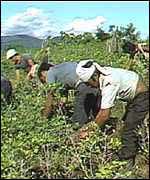An excellent article in the American Prospect:
“Drugstore Cowboys –
How America’s wrongheaded war on drugs brought down Bolivia’s president”
by Christopher Hayes

…imagine, for a moment, how Paris would have reacted if, during Prohibition, Calvin Coolidge had begun paying the French government huge sums of money to burn its country’s vineyards. It seems a safe assumption that the hypothetical French prime minister who collaborated with such a policy wouldn’t have lasted long in office.Burning Prohibition-era French vineyards may seem like a ludicrous scenario, but it’s more or less analogous to the current U.S. policy of coca eradication in Latin America. So it should come as little surprise that Bolivian President Gonzalo Sanchez de Lozada resigned earlier this month amid growing popular opposition to his support of American eradication efforts in his country.For Bolivia’s indigenous majority, coca is not just another plant. People have been chewing coca leaves on the altiplano — the windswept Andean plateau that stretches through the eastern third of Bolivia and parts of Peru — for about 4,000 years, and to this day coca occupies an incredibly central role in indigenous culture. “Coca leaves are used in everyday interactions in Aymara and Quechua culture as gestures of friendship, like exchanging a cigarette or a cup of coffee,” says University of Illinois anthropologist Andrew Orta, who studies the region. Aside from being chewed, the coca leaf is used in tea, rubbed on cuts and employed during ritual offerings to local deities. Because coca is grown and chewed mostly by the country’s indigenous majority, it has also become an expression of identity. Across Bolivia, graffiti, signs and T-shirts proclaim, “The Coca Leaf is Not A Drug!”
The entire article is worth reading. It shows just how out of touch our foreign policy is related to the drug war. Our drug eradication policies destroy the economies of countries and increase violence and instability, and despite all that, the net flow of drugs to the United States is not significantly reduced.
Update: Another good article on the subject in the Miami Herald by Jeffrey D. Sachs, professor of economics and director of the Earth Institute at Columbia University: Another U.S. Foreign-Policy Failure.
When the preceding Bolivian government faced U.S.æ demands to destroy the coca crop, I advised it to insist on adequate aid to finance economic development benefiting the hundreds of thousands of displaced peasant farmers and their dependents.æ Desperate for any assistance at all, Bolivia’s government ultimately uprooted thousands of hectares of peasant crops — and got almost nothing in return but phony slogans about alternative development.

